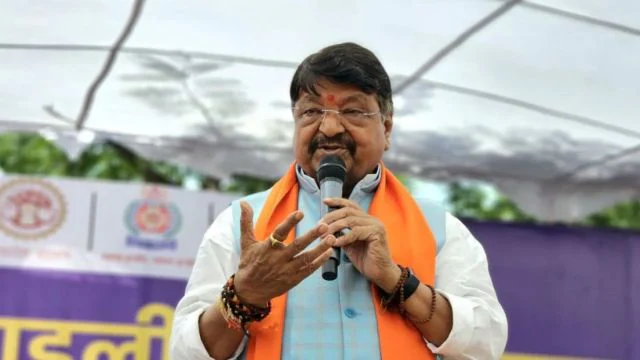A fresh political controversy has erupted after BJP leader Kailash Vijayvargiya made a remark suggesting that the Leader of Opposition had kissed his sister in public. The comment, which was widely seen as personal and inappropriate, has drawn sharp condemnation from the Congress party, with leaders accusing the BJP of lowering the dignity of public discourse.
The Controversial Remark
While addressing a gathering, Vijayvargiya reportedly referred to a recent public appearance by the Leader of Opposition, framing it in a manner that many interpreted as mocking and derogatory. His statement—phrased around the image of “kissing a sister in public”—was meant to question the behavior and propriety of the opposition leader, but it immediately triggered outrage.
Congress Hits Back
The Congress party wasted no time in criticizing the remark, calling it a “cheap and distasteful attempt” to divert attention from real issues such as unemployment, inflation, and governance failures. Party spokespersons argued that leaders of Vijayvargiya’s stature should be discussing policy and people’s concerns, not resorting to what they described as personal attacks and character assassination.
BJP’s Defense
Within BJP circles, some leaders sought to play down the controversy, suggesting that Vijayvargiya’s words were taken out of context or exaggerated for political mileage. However, the remark has sparked an internal debate about whether such language damages the party’s image, especially at a time when it seeks to project itself as a disciplined, issue-focused force.
A Pattern in Political Rhetoric
This incident is not isolated. In recent years, Indian politics has frequently witnessed personal remarks overshadowing policy debates. From barbs over family connections to jibes about personal lives, leaders across parties have crossed the line of civility. Observers note that while such remarks grab headlines, they often distract from substantive discussions about governance and public welfare.
The Gender Dimension
Congress leaders have also raised the gender sensitivity angle, arguing that such remarks trivialize relationships and disrespect women. Women’s wings of the party condemned the comment, stating that it reflected a patriarchal mindset and showed insensitivity in public language.
Public Reaction
Public response has been mixed. While some view Vijayvargiya’s comment as unnecessary and unbecoming of a senior leader, others dismiss it as part of the rough-and-tumble of Indian political banter. On social media, hashtags both criticizing and defending him trended, reflecting the polarized nature of political discourse today.
Conclusion
The controversy over Kailash Vijayvargiya’s remark illustrates how political communication in India often slips into personal territory, undermining the seriousness of democratic debate. While the BJP may attempt to contain the fallout and Congress seeks to capitalize on it, the larger question remains: Should leaders of national parties be indulging in personal remarks, or should they rise above such rhetoric to focus on the pressing issues that affect citizens’ daily lives?



